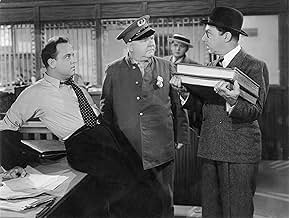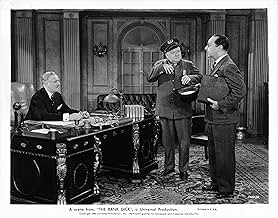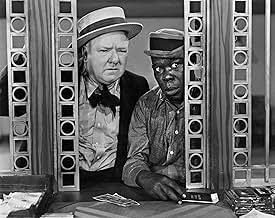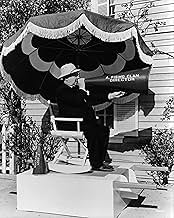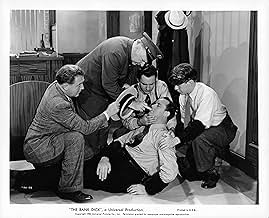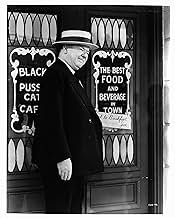IMDb-BEWERTUNG
7,1/10
8049
IHRE BEWERTUNG
Füge eine Handlung in deiner Sprache hinzuHenpecked Egbert Sousé has comic adventures as a substitute film director and unlikely bank guard.Henpecked Egbert Sousé has comic adventures as a substitute film director and unlikely bank guard.Henpecked Egbert Sousé has comic adventures as a substitute film director and unlikely bank guard.
- Regie
- Drehbuch
- Hauptbesetzung
- Auszeichnungen
- 1 wins total
Dick Purcell
- Mackley Q. Greene
- (as Richard Purcell)
Empfohlene Bewertungen
"The Bank Dick" is the most consistently funny comedy from W.C Fields. The routines and the dialogue are far above average, as is Fields himself. The plot concerns a small town loafer who first becomes a movie director during a film's shoot. Later on, he accidentally foils an attempted robbery at the local bank. For his reward, W.C Fields is employed as the bank's security guard. All kinds of comic mayhem ensure! Released in 1940, "The Bank Dick" was about the last film of any quality from W.C Fields. He only lived a few more years and his chronic drinking was getting the better of him. The laughs are pretty good here and Fields has dialogue that's worthy of his style.
The irreverent Fields gives spark to what would otherwise have been a quite humdrum comedy movie.
His politically incorrect jokes seem very present-day, and so makes you understand that the people back in the 1940's weren't so far removed from us as we sometimes think.
Fields is nasty to children, his wife and the bank examiner, whistles at pretty girls and in general just behaves terribly. You wouldn't think they would film stuff like that back in 1940, but Fields did. The movie is populated by crooks and phonies, as for instance the bank president, who says "let me give you a hardy handshake" and then just rests his hand lightly in Fields' for a second. It's a very observant and stinging visual commentary which tells more than many phrases: that's what films are good at, and it is used here to great effect.
The final car chase is really scary, with extra's ducking under cars with only inches to spare!
His politically incorrect jokes seem very present-day, and so makes you understand that the people back in the 1940's weren't so far removed from us as we sometimes think.
Fields is nasty to children, his wife and the bank examiner, whistles at pretty girls and in general just behaves terribly. You wouldn't think they would film stuff like that back in 1940, but Fields did. The movie is populated by crooks and phonies, as for instance the bank president, who says "let me give you a hardy handshake" and then just rests his hand lightly in Fields' for a second. It's a very observant and stinging visual commentary which tells more than many phrases: that's what films are good at, and it is used here to great effect.
The final car chase is really scary, with extra's ducking under cars with only inches to spare!
a source of strange joy, even in its quiet and failed moments. great moments mostly mumbled and underplayed so that the film seems so humble and so unaggressive, unlike most comedies now which would wring your neck if they could...Fields' before-its-time irony and self-consciousness about moviemaking is revealed in a throwaway line during the car chase at the end...in the midst of all the obviously speeded-up film and projection effects, Egbert Souse deadpans "you're going to make me have an accident....." I'm almost ready to move into Lompoc, with its Spanish-Americo chili parlor, and, I hope, "rivers of beer flowing over your grandmother's paisley shawl...." and, apparently, absinthe is still available....
W.C. Fields uses his expert timing and his large collection of gags to make "The Bank Dick" a classic comedy that gets even better as it goes along. The amusing, tangled plot gives Fields plenty of material to work with, and the other characters also pitch in to keep you smiling.
After a few amusing introductory scenes that introduce Egbert Sousé, the kind of character Fields loved to play, things really start rolling once Egbert somehow manages to land a job as a bank detective. The wackier the plot gets, the more it shows just how effective Fields's dry style can be. His stoic character and the confusion going on around him often make a hilarious combination. It's very entertaining, goes by quickly, and is filled with comic detail that makes it just as funny when you watch it over again.
After a few amusing introductory scenes that introduce Egbert Sousé, the kind of character Fields loved to play, things really start rolling once Egbert somehow manages to land a job as a bank detective. The wackier the plot gets, the more it shows just how effective Fields's dry style can be. His stoic character and the confusion going on around him often make a hilarious combination. It's very entertaining, goes by quickly, and is filled with comic detail that makes it just as funny when you watch it over again.
A classic comedy from the irreverent W. C. Fields who unapologetically dismantles as many of the Production Code's rules as he can as he frequents the Black Pussy, a bar managed by Shemp Howard, one-third of the Three Stooges. The plot is secondary to the gags, which come thick and fast; they don't always hit, but when they do they're smack bang in the centre of the bullseye.
Wusstest du schon
- Wissenswertes"Mahatma Kane Jeeves" (the pseudonym used by W.C. Fields as screenwriter) is a play on words from stage plays of the era. "My hat, my cane, Jeeves!" And in fact, at the end of the film his butler does hand him his hat and his cane.
- PatzerIn the opening bit of dialogue, one of the old ladies points out that there is an "accent grave" over the final e in a character's name, meaning it would be pronounced "Sous-AY", not "Souse". In fact, it's an accent aigu (or acute accent), in both pronunciation and painted on the mailbox she's looking at.
- Zitate
Egbert Sousé: [at the bar of the Black Pussy Cat cafe] Was I in here last night and did I spend a twenty dollar bill?
Joe Guelpe: Yeah.
Egbert Sousé: Oh boy, what a load that is off my mind! I thought I'd lost it.
- VerbindungenFeatured in Frances Farmer Presents: Bank Dick (1958)
- SoundtracksHome Sweet Home
(1823) (uncredited)
Music by H.R. Bishop
Background music near the beginning of the movie and at the end
Top-Auswahl
Melde dich zum Bewerten an und greife auf die Watchlist für personalisierte Empfehlungen zu.
- How long is The Bank Dick?Powered by Alexa
- Why do Fields and Howard refer to his drink as a poultice ? A poultice is usually a medicinal herbal wrap.
Details
- Laufzeit1 Stunde 12 Minuten
- Farbe
- Seitenverhältnis
- 1.37 : 1
Zu dieser Seite beitragen
Bearbeitung vorschlagen oder fehlenden Inhalt hinzufügen

Oberste Lücke
By what name was Der Bankdetektiv (1940) officially released in Canada in English?
Antwort
